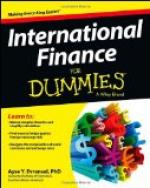of the semi-speculative kind, the prospects of which
have not been so well tested that the shareholders
are at least bound to have a fair chance of success.
The ideals of the issuing houses have so far advanced
since the days of the Honduras scandal, that in the
time of the late war in the Balkans none could be
found to father any financial operation in London
on behalf of any of the warring peoples. It only
remains for the education of the investor to continue
the progress that it has lately made, for the waste
of capital by bad investment to be greatly curtailed.
Probably there will always, as long as the present
financial basis of society lasts, be outbursts of
speculation in which a greedy public will rush madly
after certain classes of stocks and shares, with the
result that a few cool-headed or lucky gamblers will
be able to live happily ever after as country gentlemen,
and transmit comfortable fortunes to their descendants
for all time. This is the debt that society pays
for its occasional lapses in finance, just as its lapses
in matters of taste are paid for by the enriching
of those who provide it with rubbishy stuff to read,
or rubbishy shows in picture palaces. The education
of the individual in the matter of spending or investing
his or her money is one of the most pressing needs
of the future, and only by its progress can the evils
which are usually laid to the door of finance be cured
by being attacked in their real home. In the meantime
much might be done by more candid publicity and clearer
statements in prospectuses of the objects for which
money lent is to be used and of the terms on which
loan issues have been arranged. Any reasonable
attempts that may be made to improve the working of
International Finance are certain to have the support
of the best elements in the City.
At the same time we may hope that as economic progress
goes slowly ahead over the stepping stones of uncomfortable
experience, borrowing countries will see that it really
pays them to pay their yearly bills out of yearly
taxes, and that they are only hurting themselves when
they mortgage their future revenue for loans, the
spending of which is not going to help them to produce
more goods and so raise more revenue without effort.
War is the only possible excuse for asking foreign
nations to find money for other than reproductive purposes.
In time of war it can be justified, even as an individual
can be justified for drawing on his capital in order
to pay for an operation that will save his life.
But in both cases it leaves both the nation and the
individual permanently poorer and with a continuous
burden to meet in the shape of interest and sinking
fund, until the loan has been redeemed. Loans
raised at home have an essentially different effect.
The interest on them is raised from the taxpayers
and paid back to the taxpayers, and the nation, as
a whole, is none the poorer. But when one nation
borrows from another it takes the loan in the form




